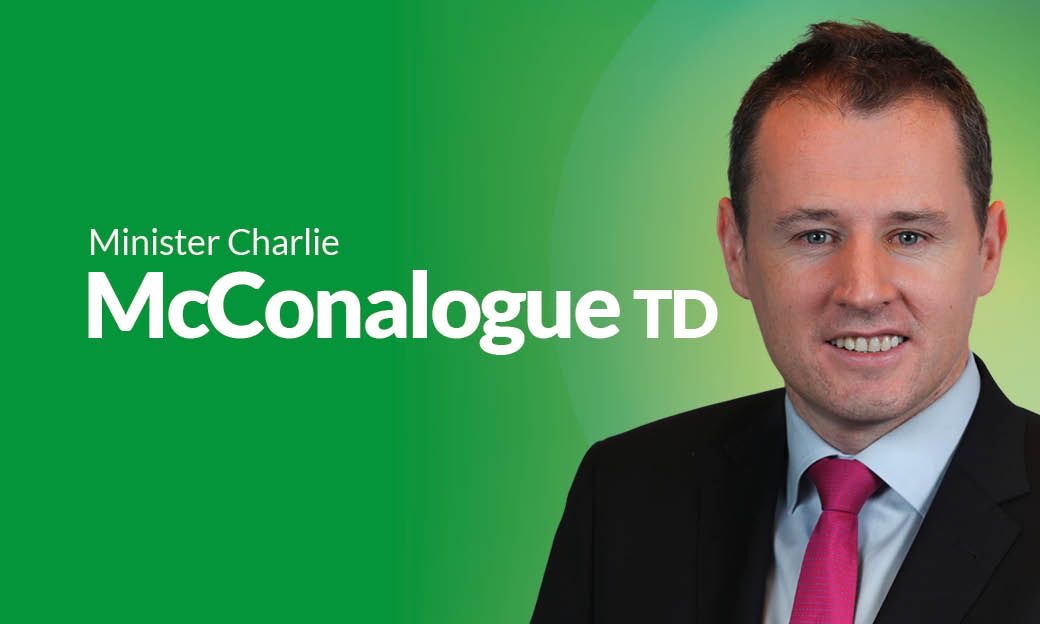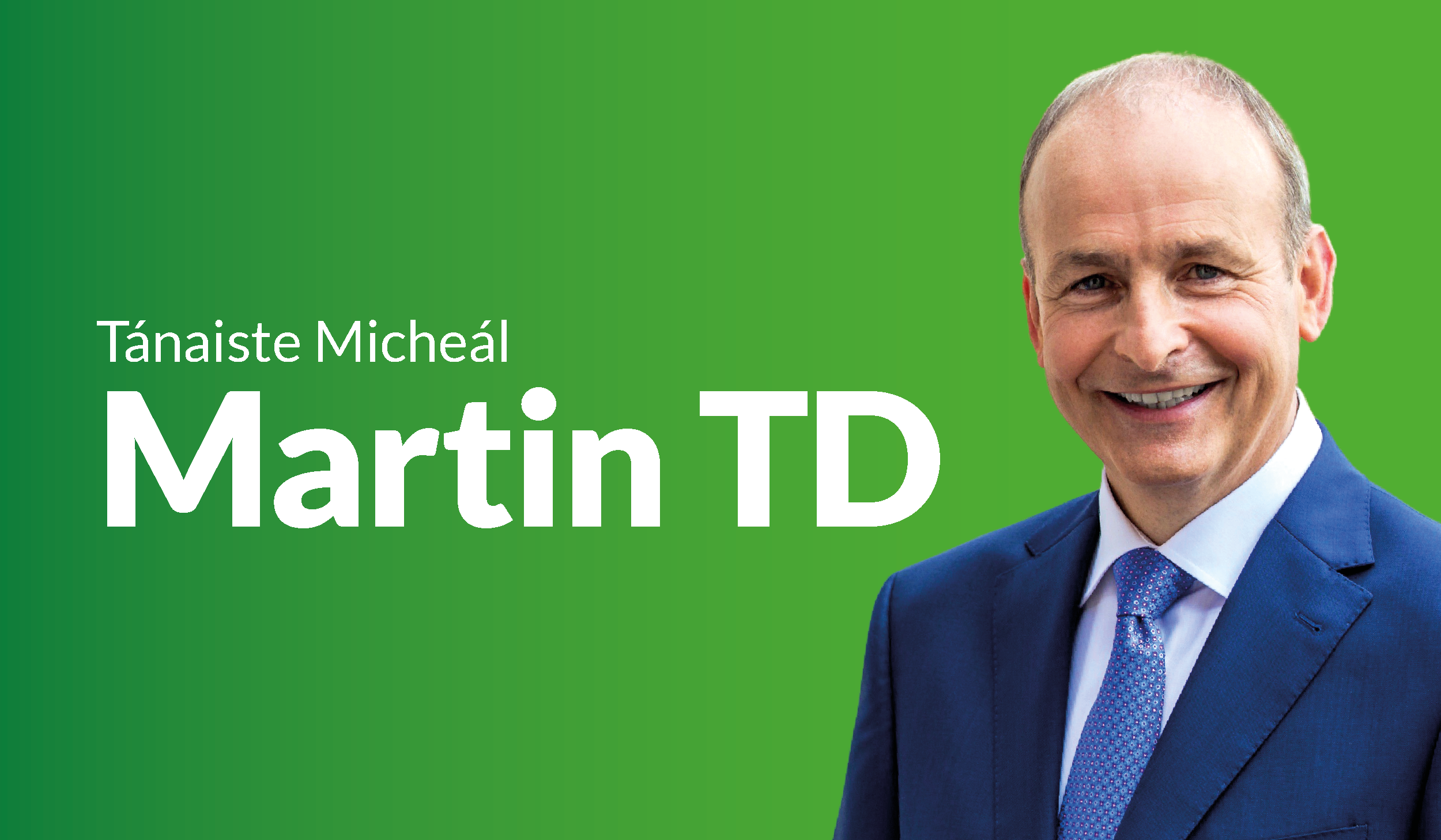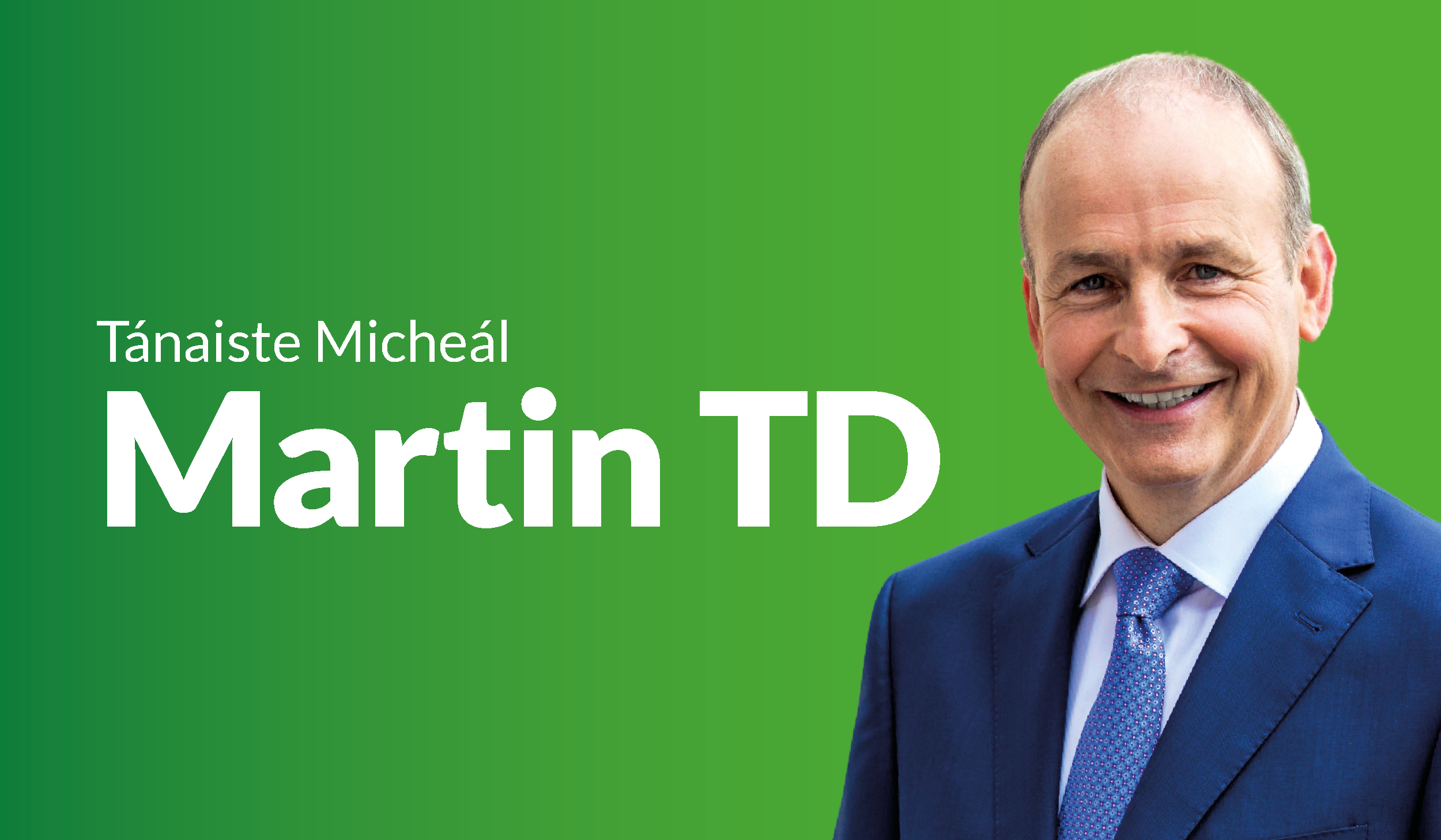Commemoration of Ballyseedy Massacre - An Tánaiste, Micheál Martin TD
Published on: 05 March 2023
Is é an spiorad ina bhfuilimid bailithe le chéile inniu ná spiorad an ómóis agus an chuimhneacháin. Ar ámharaí an tsaoil, níl imeachtaí mar uafáis mhí an Mhárta míle naoi gcéad fiche trí ag tarlú in Éirinn an lae inniu.
Ag an am céanna, tá dualgas orainn cuimhneamh agus machnamh a dhéanamh ar ár stair. Agus ag déanamh sin, tá orainn rudaí a fhoghlaim ón spiorad díobh siúd a tháinig slán agus a raibh sí mar aidhm leagtha amach acu cabhrú lena gcontae agus a dtír a bhogadh chun cinn.
In the history of our country, we have many moments which we remember with immense pride.
Many heroic events and personalities who we honour as central to our national story.
Over recent years, both locally and nationally, we have gathered to celebrate some of the most important figures and events in our history. In doing this we have reflected on what we owe to the great generation which sacrificed and achieved so much in our revolution.
Yet if we are to be honest in remembering our past, we must also make time for darker events – for moments which no one could possibly be proud of, and which left deep scars.
Unquestionably, the brutal massacre in Ballyseedy on the night of the 6th and 7th of March 1923 marked one of the lowest points in our national story. Even after a hundred years what happened here retains the power to shock.
But we come here today not to reopen wounds or to insist on one version of our history. No, we come here to honour the memory of those young lives lost on that night and in other events in Kerry that terrible month.
We come here with reflection and with respect for the spirit which helped Kerry and our country to get through those days, to move forward and to rebuild a sense of community.
In the years of our revolution Kerry played a central role. Its people were united and endured much in our fight for independence. They bequeathed to new generations a long roll of honour containing the names of Kerry men and women who were willing to sacrifice everything for our country.
They believed, and they have been proven right time and again, that the Irish people, in charge of their own destiny, could grow and prosper amongst the nations of the world.
But this unity did not survive the impact of the Treaty and the outbreak of civil war.
The insistence by the departing power that it should retain the power to impose conditions on the new state was the direct and undeniable cause of this division – and it is the great tragedy of 1922 that formerly close comrades were not given the space and freedom to find a different way forward.
While there were harsh words spoken, and these got harsher as time went on, throughout the private papers of the first half of 1922 you find leaders desperate to bridge the widening gap with friends who were fast becoming enemies.
Within just over two months the ultimate outcome of the civil war was already clear, but it was then that the worst events began.
By the beginning of March 1923, something close to normal life had returned to much of the country as the government forces overwhelmed republicans. The strength of the republican cause in Kerry meant that fighting continued here.
The government forces had for nearly seven months controlled most of the county, yet resistance remained stubborn.
I believe that the terrible crimes committed by government forces against prisoners deserve to be singled out and condemned in and of themselves – but an honest remembrance must also acknowledge that other incidents which were the responsibility of others.
In particular, we cannot remember March 1923 without acknowledging that the blowing up of five soldiers at Knocknagoshel was a cruel and terrible event. It caused genuine shock throughout the community even amongst those in whose name it was carried out.
It is the mark of honest, democratic remembrance to combine honouring your own with genuinely reflecting on the hurt caused to others – and to be willing to admit when there are different stories to be respected.
It is understandable that news of Knocknagoshel was met with anger – though what happened in the days and weeks later was not because of any righteous motive. It reflected a brutal lawlessness which was already evident in the actions of certain men wearing uniforms which were supposed to represent legal authority but actually gave them impunity for some of the worst actions seen in our modern history.
There was a concerted effort to cover-up what happened here and then at Countess Bridge and Bahaghs, Cahirsiveen, but the people of Kerry and the authorities always knew the truth. It was premeditated murder, nothing less.
When Stephen Fuller ultimately put on the public record the full story of what happened on that night the power of his words came from the fact that he told the simple, unblemished facts of young men being led to their planned deaths.
‘We were made lie flat down in the lorry and taken out to Ballyseedy.
And, they tied us then, our hands behind our back, and left about a foot between the hands and the next fellow. They tied us in a circle then around the mine… And they tied our legs then, and the knees as well with a rope. And then they threw off our caps and they said we could be praying away now as long as we like. So the next fella to me said his prayers, and I said mine too. But I still kept watching where they went. It was that that saved me afterwards.
But he said goodbye then, and I said goodbye, and the next fella picked it up, and he said goodbye, goodbye lads, and up it went. And I went up with it.’
And with that eight young lives were lost. Fuller’s miraculous survival is why the full truth could not be hidden in spite of a concerted cover-up.
His service as a member of Fianna Fáil and as a Fianna Fáil TD means that we have a special duty to remember him and honour his life. Though, let there be no doubt, the story Stephen Fuller and his comrades belongs to no party. It is part of our national story, and one which we must never allow to be forgotten.
Speaking nearly six decades after the events, Fuller’s voice is one of sadness and reflection. He is not seeking vengeance. He is not calling us to keep up the fight. No, he is asking that we remember. That we understand the truth. That we never let such terrible things happen again in our country.
And Stephen Fuller was providing a final and complete refutation of the false stories spread in the days and months after Ballyseedy – all designed to pretend that these men were killed clearing mines planted by their own comrades.
We should also today pay tribute to those who have worked so hard to make sure that the full truth of what happened here and elsewhere in Kerry has been made public.
Pat Butler’s documentary, first broadcast 25 years ago, is one of the finest examples of public service broadcasting in our history. Its clarity and fearlessness had an impact far beyond that achieved by any other historical documentary.
The recent series of articles by the Irish Examiner have shown again how important professional journalism is in providing us a picture of the diversity, complexity and emotion we can see in our past. And of course, different historians have spent countless hours reconstructing the full details of the events, personalities and emotions of the civil war in Kerry and its many scars. The recent book by Owen O’Shea is an example of scholarship of the highest standards.
When we look at the full record of March 1923 we have every right to say that this was a terrible crime and the failure to stop the lawlessness or hold anyone to account is to the shame of everyone involved.
The cover-up and the false statements by government in claiming that these deaths came from clearing mines were infamous then and they remain so today.
And it is essential that we understand that in saying this we are trying to impose the values of today onto the past. This is a common failing when we talk about Irish history, but it is not relevant here because there is no doubt that a hundred years ago everyone understood that what happened at Ballyseedy was unjustifiable.
Even within the government there were active disputes about the refusal to intervene, demand accountability and stop the brutality.
For example, we can see this from the comments of Cahir Davitt, who served as the chief judge of the Army throughout the civil war. The son of Michael Davitt, he had headed the Dáil Courts during the War of Independence and he fought an ongoing battle within the new army to demand even basic adherence to the rule of law.
In his official statement in the Bureau of Military History he is clear in describing Ballyseedy as an “outrage”, committed by soldiers and tantamount to what he termed “unofficial executions”. Davitt felt, I believe correctly, that the cause of the new state and rebuilding national unity was gravely damaged.
In spite of having created constitutional and legal mechanisms for quite brutal actions, the amnesty which was implemented after the war and the destruction of many records showed that, no matter what they said publicly, leaders knew that many actions were illegal and unjustifiable.
In truth, when you look at the events of the nine months of the civil war, it’s impossible to miss the fact that most of the worst events of the war happened after its ultimate outcome had become obvious. By March 1923 it was well understood that the new state was no longer in danger and the republican forces had no real objectives.
What happened at Ballyseedy, Countess Bridge and Bahaghs, and in the executions of 81 prisoners, left a trail of bitterness which was an enormous burden for the new state the carry as it faced so many challenges.
However, we did move beyond the events of March 1923. We did rebuild a deep and enduring sense of community.
I think a major part of the reason why this happened is because of the actions of many of the men and women, on both sides, who were involved.
Wherever you look in the memoirs and records of the leaders and ordinary participants of the civil war you find a reluctance to dwell on what happened – a near complete refusal to indulge in the type of partisanship and celebration which such conflicts have led to in many other countries.
Stephen Fuller’s decision to wait nearly six decades before giving a full public account of what happened at Ballyseedy came from his desire that this place and his people not be defined by acts which no one could be proud of. He did not want to relive that night or to have others refight the struggle, he wanted us to create a new future.
The same was true of the overwhelming body of women and men who fought on both sides. I experienced this within my own family, we loved to hear the many great stories of the War of Independence but were met with silence when the period after December 1921 was mentioned.
We are one of the few countries in the world where opponents in a civil war have gone on to peacefully succeed each other in democratic elections, or where large numbers moved their political allegiance without changing their minds on the conflict.
With very few exceptions, those who experienced the civil war were determined that it should be the end of armed conflict. For them the democratic objectives which are at the heart of the 1916 Proclamation demanded that we find a way beyond conflict – and that we honour the achievements of our independence struggle through using the new opportunities open to us.
Ballyseedy is a part of our history which we must never forget but, - just as Stephen Fuller and those who served on both sides of that terrible war believed – it cannot define us.
In coming here to remember the events of a century ago it is the spirit of understanding and renewal which we should seek.
Táimid tagtha go Baile Uí Shíoda inniu, ní chun ceiliúradh ach chun tuiscint a fháil ar ár stair achrannach trioblóideach agus ceachtanna a fhoghlaim ó na laethanta trioblóideacha uafásacha sin ar conas spiorad nua agus níos fearr a chur chun tosaigh sa tír.
Ends



